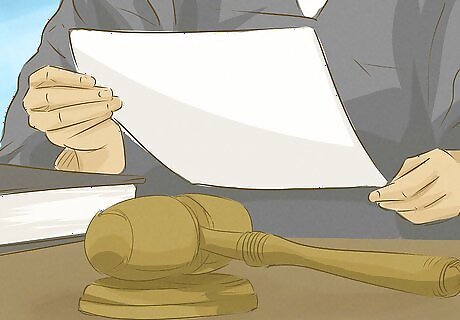
views
Submitting a Complaint to Your Local Government

Gather necessary information. Your first step in resolving any problem associated with your rented housing should be to contact your landlord or building manager and attempt to have the problem resolved in this fashion. If this approach proves unsuccessful, your next step should be to contact your local city/county government and enlist its help in resolving your issue. Before you do this, you will want to gather all the information you will use to make the complaint. This information should include: Your name, mailing address, phone number, and e-mail address. The same information (or as much as you can obtain) for your landlord/building manager. A detailed description of your complaint, including the exact nature of the problem, any pictures you have taken to showcase the problem, the steps you have taken to correct it, and all relevant dates (e.g., the date you noticed the problem, the dates you contacted your landlord, etc.). A copy of your lease, any applicable bills (such as repair invoices), and copies of all communication between you and your landlord.

Determine where to file your complaint. Your next step should be to file an official complaint with your local government. Depending on where you live, this could either be with the government of the town in which you live, or in the county of which that town is a part.
Start by conducting an internet search for "city/county of <

Draft your complaint. When submitting your complaint to your local government, you will most likely be using a form. On that form, you will provide the information you gathered regarding names, dates, and addresses. There will also be a space to provide a detailed description of your complaint. When filling out the portion of the form where you detail your complaint, try to keep the following in mind: Use a positive, non-accusatory tone whenever possible. Your local government will be acting as an impartial fact-finder during its investigation. You don't want to start off on the wrong foot by demanding a resolution or insulting your landlord. Stick to the facts and try not to editorialize. Explain the issues you are having as clearly and succinctly as possible. Many forms have a word limit, or limited space in which to write. When detailing your problem, be sure to include all relevant information that illustrates the problem you are having, but don't go into unrelated issues. When in doubt, keep your complaint short, simple, and to the point. Be sure to explain how your landlord could fix the problem.

Write down any information your city/county provides. After you file your complaint with your city/county, you will be assigned a number that the city/county will use to identify and track your case. This number may be referred to in several ways—e.g., a case number, complaint number, tracking number, etc.—but serves the same function, which is to provide you a way to follow-up on your case as it is investigated. Make sure to write down this number and keep it in your records so you can reference it later.

Follow through with your complaint. The exact process by which your city/county conducts its investigation and attempts to resolve your issue will vary based on the city/county. Generally, however, you should expect some or all of the following actions: The city/county may attempt to contact your landlord/building manager and work out a solution with him or her. The city/county may send a housing inspector to your property to gather information and verify the problem detailed in your complaint. The city/county may contact you after some time has lapsed since your initial complaint to see if your issue has been resolved. If it has not—or has only been partially corrected—be sure to let the person who contacted you know. The city/county may refer your case to other government agencies who can assist you.

Keep all records. Be sure that, during this process, you keep any and all records and correspondence between you and your landlord, between you and your local government, and any other documents or forms you receive pertaining to your dispute. If the city/county does not resolve your issue in a satisfactory manner, you may have to take additional steps to correct the problem. Making sure all of this documentation is safely in your records will make your case stronger in the future.
Submitting a Complaint to Your State Government

Determine where to file your complaint. If you have already tried resolving your issue with your landlord directly, have submitted a complaint to your local government, and your issue is still unresolved, your next step should be to submit your complaint to a state governmental agency. Depending on your state, this will either be the Attorney General's Office or your state's department of consumer affairs/consumer protection.
Conduct an internet search for "<

Draft your complaint. When submitting your complaint to your state government, you will most likely be using a form. On that form, you will provide the information you gathered regarding names, dates, and addresses. There will also be a space to provide a detailed description of your complaint. When filling out the portion of the form where you detail your complaint, try to keep the following in mind: Use a positive, non-accusatory tone whenever possible. Your state government will be acting as an impartial fact-finder during its investigation. You don't want to start off on the wrong foot by demanding a resolution or insulting your landlord. Stick to the facts and try not to editorialize. Explain the issues you are having as clearly and succinctly as possible. Many forms have a word limit, or limited space in which to write. When detailing your problem, be sure to include all relevant information that illustrates the problem you are having, but don't go into unrelated issues. When in doubt, keep your complaint short, simple, and to the point. Be sure to explain how your landlord could fix the problem.

File your complaint. Certain state agencies allow for online submission of complaints, some provide a telephone number you can use to make your complaint, and still others require you to complete and mail in a form. Like with your local government, you will need to provide certain information to the agency, such as: Your name and contact information. The name and contact information of the individual your complaint is against. Identifying information for the housing involved. A description (including relevant dates) of the problem. The steps you have taken to resolve the dispute. What would need to happen in order for you to feel that your complaint is resolved.

Follow through with your complaint. The exact process by which the state agency conducts its investigation and attempts to resolve your issue will vary based on the state. Generally, however, you should expect some or all of the following actions: The agency may send you a letter confirming your complaint submission. The agency may conduct an investigation. The agency may refer you and your landlord to mediation, so your dispute can be settled informally. The agency may attempt to contact your landlord/building manager and work out a solution with him or her. The agency may contact you after some time has lapsed since your initial complaint to see if your issue has been resolved. If it has not—or has only been partially corrected—be sure to let the person who contacted you know.

Keep all records. Be sure that, during this process, you keep any and all records and correspondence between you and your landlord, between you and any state agency, and any other documents or forms you receive pertaining to your dispute. You may need this information later if your complaint stays unresolved.
Using Alternative Methods to Resolve Your Issue

Withhold rent. If your landlord or building manager refuses to make a vital repair or correct some ongoing issue with your rental property, you can consider withholding some or all of your rent in order to encourage the landlord to resolve your issue. Be wary, however, that each state's landlord–tenant laws are different, and that you generally must meet certain requirements (such as informing your landlord, making sure you did not cause any of the damage, that the defect makes your property not safe, etc.) based on that law in order to legally withhold rent.
To determine if this is a possibility for you, try conducting an internet search for "<

Make the repairs yourself, then deduct the cost from rent. Another option you may have is to make the repairs yourself (or have them done by hiring a professional), and then deduct the cost of those repairs from your rent. As with the previous option, you should be sure that your state's laws provide for this. Again, your best option is to contact a local attorney and ask him or her for advice on this matter.

Move out. If the problem continues to go unresolved, you can consider terminating your lease and moving out. If your lease will expire shortly, wait until it does and move out. If not, you should consider the benefits of terminating your lease early against the benefits of relocating to a place that does not have the problem you are currently experiencing. Be sure to read the terms of your lease carefully before you make a decision like this. Often, lease agreements will contain terms that describe what will happen in the event the lease is terminated early (e.g., the renter having to pay a penalty or surrender a security deposit). If the language in the contract is complicated or you are having difficulty understanding it, try contacting an attorney who might be able to help. An experienced attorney will be able to give you the best advice regarding your options, especially if you tell him or her the exact nature of the problem forcing you to consider breaking your lease.

Take legal action. Another option you might have—depending on the nature of your issue with your landlord—is to take him or her to court. Again, your state's laws will determine what legal rights and remedies to which you have access. Before attempting this action, it is best to talk with an experienced lawyer who will understand the particular facts of your situation and can recommend the best course of action for you.




















Comments
0 comment